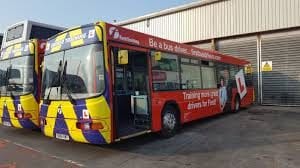By David Jepson (ACH) and Bridget Anderson
Huge changes to the labour market are underway, and digitisation is changing how people are recruited and the kind of work they do, not least in phenomenon of the gig economy. Can these changes benefit refugees and migrants and if so, how? These issues were discussed in the second workshop, in a series of three, aiming to break down barriers between academic research and practitioner organisations. This particular event was led by Tonia Novitz and Harry Pitts (UoB), with David Jepson and Lydia Samuel (ACH/Himilo) and was attended by about 20 people from a range of backgrounds and interests.
 ACH/Himilo work with around 2500 people every year, aiming where possible to help individuals to gain median level jobs rather than simply entry level work. For example, we are currently running a training scheme for drivers for First Bus. Economic opportunity is central to building autonomy and facilitating what at ACH/Himilo we think of as ‘self-integration’, enabling participation in wider civil, community and social networks. How will people like our clients be impacted on by labour market changes? Dr Harry Pitts from the School of Management, said that these changes will undoubtedly affect jobs but the scale of change is difficult to predict. He discussed the problems associated with the kind of precarious work generated by the gig economy including the significant increase in false self-employment where workers lack genuine autonomy. He outlined examples of initiatives such as SMART in Belgium, an organisation supporting workers who find themselves in these types of situations, and offering administrative, legal, fiscal and financial advice. This sort of initiative is beneficial to all freelancers including refugee and migrant workers.
ACH/Himilo work with around 2500 people every year, aiming where possible to help individuals to gain median level jobs rather than simply entry level work. For example, we are currently running a training scheme for drivers for First Bus. Economic opportunity is central to building autonomy and facilitating what at ACH/Himilo we think of as ‘self-integration’, enabling participation in wider civil, community and social networks. How will people like our clients be impacted on by labour market changes? Dr Harry Pitts from the School of Management, said that these changes will undoubtedly affect jobs but the scale of change is difficult to predict. He discussed the problems associated with the kind of precarious work generated by the gig economy including the significant increase in false self-employment where workers lack genuine autonomy. He outlined examples of initiatives such as SMART in Belgium, an organisation supporting workers who find themselves in these types of situations, and offering administrative, legal, fiscal and financial advice. This sort of initiative is beneficial to all freelancers including refugee and migrant workers.
Changes to labour markets can offer the chance for refugees and migrants to access new employment opportunities, for example via employment platforms and crowd sourcing, but they also pose risks too, according to Professor Tonia Novitz, from the School of Law. She outlined the important differences between status as an employee, a worker or a free-lance sub-contractor. Collective engagement and organisation is important here and new forms of interaction can be developed to facilitate association at work. She also explained that public authorities also had a duty under the law in relation to diversity and employment.
Dr Laila Kasem, from the University of Worcester has researched small businesses and self-employment of Syrian Refugees in the United Kingdom. Small business can be a flexible opportunity for economic empowerment but can also be the wrong choice for some. She highlighted the problems facing middle aged men who have worked for many years in one trade which is regarded as outmoded in the UK. They can become very demotivated, and there is a need for them to have access to pathways to different forms of work.
It was very productive to have a discussion around the consequences for refugees and migrants of labour market changes as debates tend to focus on refugees’ and migrants’ impact on the labour market, and often lead to them being scapegoated for wider problems. In fact, refugees and migrants bring diversity, skills and experience that can make our economy stronger. We need that.
We look forward to the next event on 16th April which will discuss language.
Blog co-authored by:
David Jepson, Director and Policy Advisor, ACH/Himilo
Bridget Anderson, Professor of Migration, Mobilities and Citizenship, University of Bristol.

